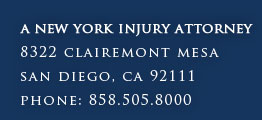
- Accident
- Auto Accident
- Automobile Accident
- Bicycle Accident
- Bike Accident
- Boat Accident
- Boating Accident
- Car Accident
- Construction Accident
- Construction Site Accident
- Medical Accident
- Motor Vehicle Accident
- Motorcycle Accident
- Pedestrian Accident
- Pharmaceutical Accident
- Pharmacy Accident
- Product Accident
- Semi Truck Accident
- Slip and Fall Accident
- Surgical Accidents
- Tractor Trailer Accident
- Truck Accident
- Trucking Accident
- Vehicle Accident
- Wrongful Death



New York Attorney Disclaimer
New York Accident Lawyer

This website is for informational purposes only. It is not intended to give legal advice. It is recommended that visitors to this website should not act upon any information contained in this website without first seeking the advice of an attorney licensed in their state. The purpose of this website is to give the visitor a general understanding of the law, not to provide specific advice. It is also intended to give some general background and information concerning cases that the law firm of Fitzgerald & Fitzgerald, P.C. is handling. The law regarding the types of cases referred to in this website often differs depending upon the local, state or federal laws and regulations, and decisions and prior court cases.
The transmission of the material on this site is not intended to create, and receipt does not constitute, the creation of an attorney/client relationship. As a matter of policy Fitzgerald & Fitzgerald, P.C. makes no agreement to represent a client unless and until a retainer agreement is signed by both the client and a member of the law firm. A prospective client should not consider himself/herself a client until such time as there is a written retainer agreement with Fitzgerald & Fitzgerald, P.C.
If after visiting this website you should contact the office of Fitzgerald & Fitzgerald, P.C., you should be aware that any opinions offered by attorneys or paralegals prior to the establishment of an attorney/client relationship, are informal and should not be considered to have been done after legal research on issues on behalf of a client. Please be aware that the transmission of an email inquiry or web contact form itself does not create an attorney/client relationship. They should not be relied upon. Fitzgerald & Fitzgerald, P.C. strongly suggests that anyone seeking legal opinions on which they intend to rely, consult with and retain an attorney licensed in their state to render a formal opinion. If you communicate with Fitzgerald & Fitzgerald, P.C. by email or through this site relating to a matter for which we do not represent you, it is possible that your communication may not be treated as privileged or confidential. Please be aware that internet email is not secure and you should avoid sending sensitive or confidential internet email messages unless they are adequately encrypted.
The attorneys at Fitzgerald & Fitzgerald, P.C. are licensed to practice law in the state of New York and certain Federal Courts in New York and other states in the United States. Some of our lawyers are licensed to practice in states other than New York and this information is contained in their individual biographies. The law firm of Fitzgerald & Fitzgerald, P.C. is able to practice "nationwide" and represent clients with cases in states other than New York by reason of our network of "Of Counsel" attorneys who are licensed to practice law in other states throughout the United States.
Statutes of Limitation
Persons who may have a claim should always be aware of the statutes of limitation in the jurisdiction in which the claim can be brought. Quite simply, the statute of limitation is the date beyond which a meritorious claim cannot be brought because it is time barred. In New York the statute of limitation for contract actions is generally 6 years from the date of the breach of contract. Statutes of limitation for fraud are generally 6 years from the date the fraud was discovered, or should have been discovered. The statute of limitation for negligence is generally 3 years. Claims for medical malpractice have a statute of limitation of 2 ½ years. Claims against municipalities may be as short as 1 year and 90 days with a requirement to file a Notice of Claim within 90 days. Some of these statutes may be tolled for periods of time for various reasons. All of these statutes of limitation should be kept in mind by anyone considering making a claim and should be checked further with an attorney who has been formally retained to give an opinion on the case.
Past Results Cannot Predict Future Results
We are proud of our accomplishments. However, we make no guarantees of results on future cases and our past results should not be read as an indication of our ability to achieve a favorable verdict or settlement on any given case.
Contingent Fees and Expenses
In New York and most other states the client remains responsible for expenses even if the attorney advances expenses. If the case is settled or a judgment collected, the expenses are deducted from the total recovered. Contingent fees are calculated after the deduction of expenses on the net recovery. If the case is lost, the N.Y. Code of Ethics requires that the client be ultimately responsible for the expenses. These issues should be discussed with an attorney before signing a contingent retainer agreement.